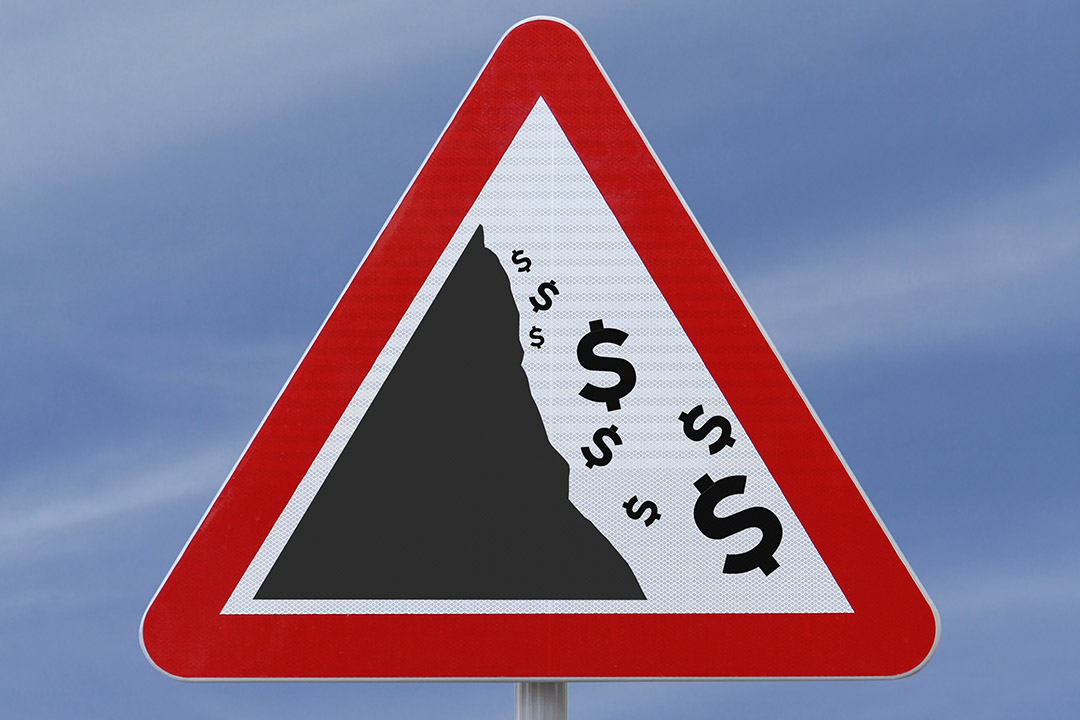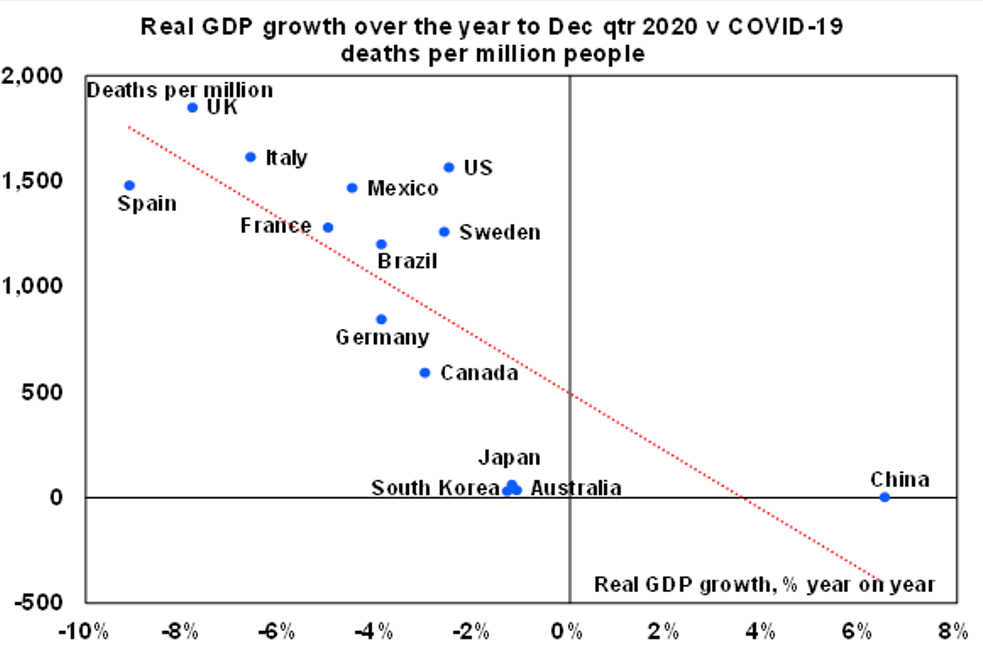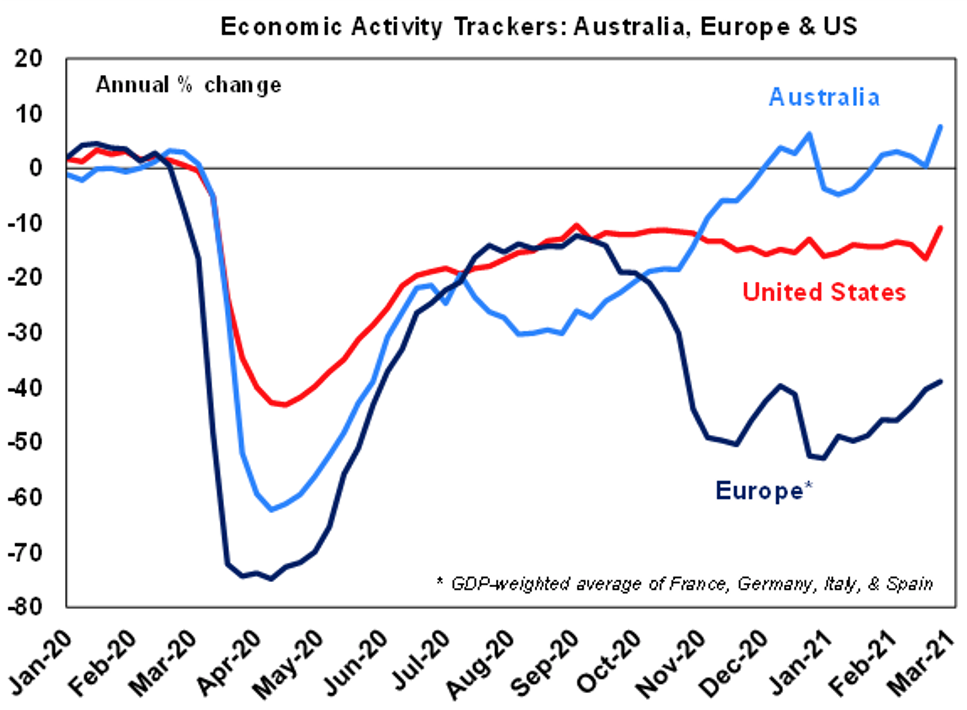

For most of us we won’t be falling anywhere when government assistance is peeled back at the end of March. But for others, there will be a cliff. So the question is: what’s Treasurer Josh Frydenberg going to do next?
In many ways, his policy decisions will be a gamble and what he decides could determine the fate of a quarter of a million workers! In The Australian newspaper today, labour market economist Jeff Borland said he thought 250,000 jobs could be lost when JobKeeper ends this month.

But the key question is: could a rapidly expanding economy absorb a lot of these workers while we wait for the vaccination rollout to help boost internal tourism ahead of international travel starting this year? And be clear on this: Australia’s brilliant defence against the Coronavirus has delivered us world-class economic dividends, as the chart above shows.
See how our death rate is on par with the world’s best. Take a look at China (if you can trust their figures) and South Korea. Meantime, our growth rate was only second to China, if you can trust their stats!
And the next chart shows how we’ve killed the likes of the US and Europe when it comes to our economic activity tracker index.

That blue line of Australia’s is going up and it only dipped and levelled out over in July to September, when Victoria went into its second lockdown.
So the overall country is winning but there are losers, who will feel the end of the government assistance that came as a response to the recession created when the Morrison Government and its state counterparts closed the economy down to fight the Coronavirus.
So while the overall economy is rebounding faster than expected (the December quarter’s economic growth came in at 3.1% instead of the expected 2.5%), there will be individual losers.
Like who?
Clearly, these include travel industry business owners and their workers, CBD businesses still waiting for office workers to return, tenants with no rental protections after March 26, landlords who’ve already lost bankruptcy relief, along with other business owners. And despite the relaxing of restrictions, there are many hospitality operations that have been helped by JobKeeper so they will feel it when this support measure goes at the end of the month.
As a group, renters could have the most to worry about with the hot house prices now starting to push up rents and eviction and rent protections in NSW, Victoria, South Australia and Western Australia will all end by the start of April.
As the newdaily.com’s Matthew Elmas pointed out, this coincides with “Federal income support through JobKeeper and JobSeeker supplements will evaporate…and bankruptcy pauses protecting some landlords will disappear in a puff of smoke — all in a single week.”
And the Australian Housing and Urban Research Institute survey of 15,000 renters taken by in 2020 found about 40% were struggling to make ends meet, while over a quarter had skipped meals to save money. And about 30% requested a rent reduction, but only half of them said they were successful.
This was 2020 and thankfully our economy has rebounded brilliantly since then. Undoubtedly, there will be knock-on effects when a business loses JobKeeper support, and a worker loses his or her job and then rent has to be found without discounts for the hardship the pandemic delivered.
How state governments deal with the rental protections could easily differ state to state but there is certainly a case for individual cases to be reviewed to see if it’s fair to support those who are economic casualties of the infection-fighting restrictions that have left these people in a mess, while delivering a boom for many other businesses and people across the country.
Good sense seems to be prevailing with the New Daily reporting that “Kevin Anderson, who handles the renter protection program, left the door open to continuing some form of emergency support continuing past March.”
By the way, this has not only been a tough time for renters, landlords have copped it too! The only saving grace for residential landlords has been the spike in house prices, which means if they need to sell out of their properties, they should get a good price. And if they need to borrow more from the bank, at least the valuation is likely to be higher.
What Treasurer Josh Frydenberg and his fellow Treasurers in the states decide could have a big impact on hundreds of thousands of Australians. Simon Westaway, the CEO of the Australian Tourism Industry Council, says tourism businesses required short-term assistance from the Government until the national vaccine rollout gets us all travelling again. Many individuals are heading for their own personal fiscal cliffs, even if the economy will avoid a huge slump. But how far these Aussies fall will largely depend on what Josh and his Treasurer mates decide this month.